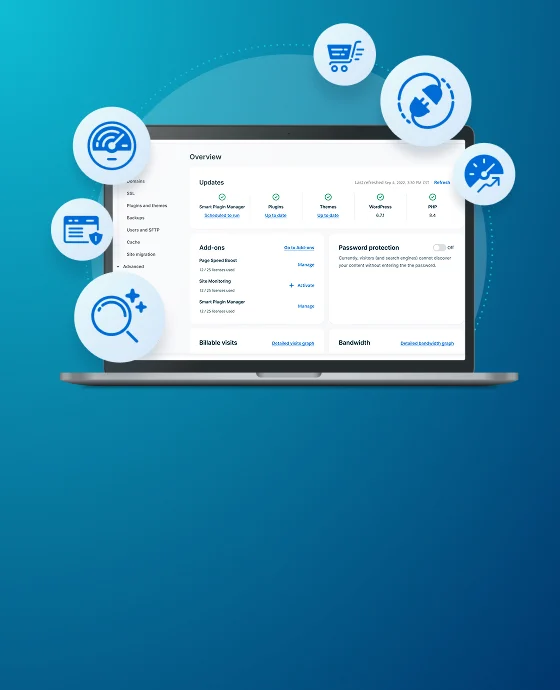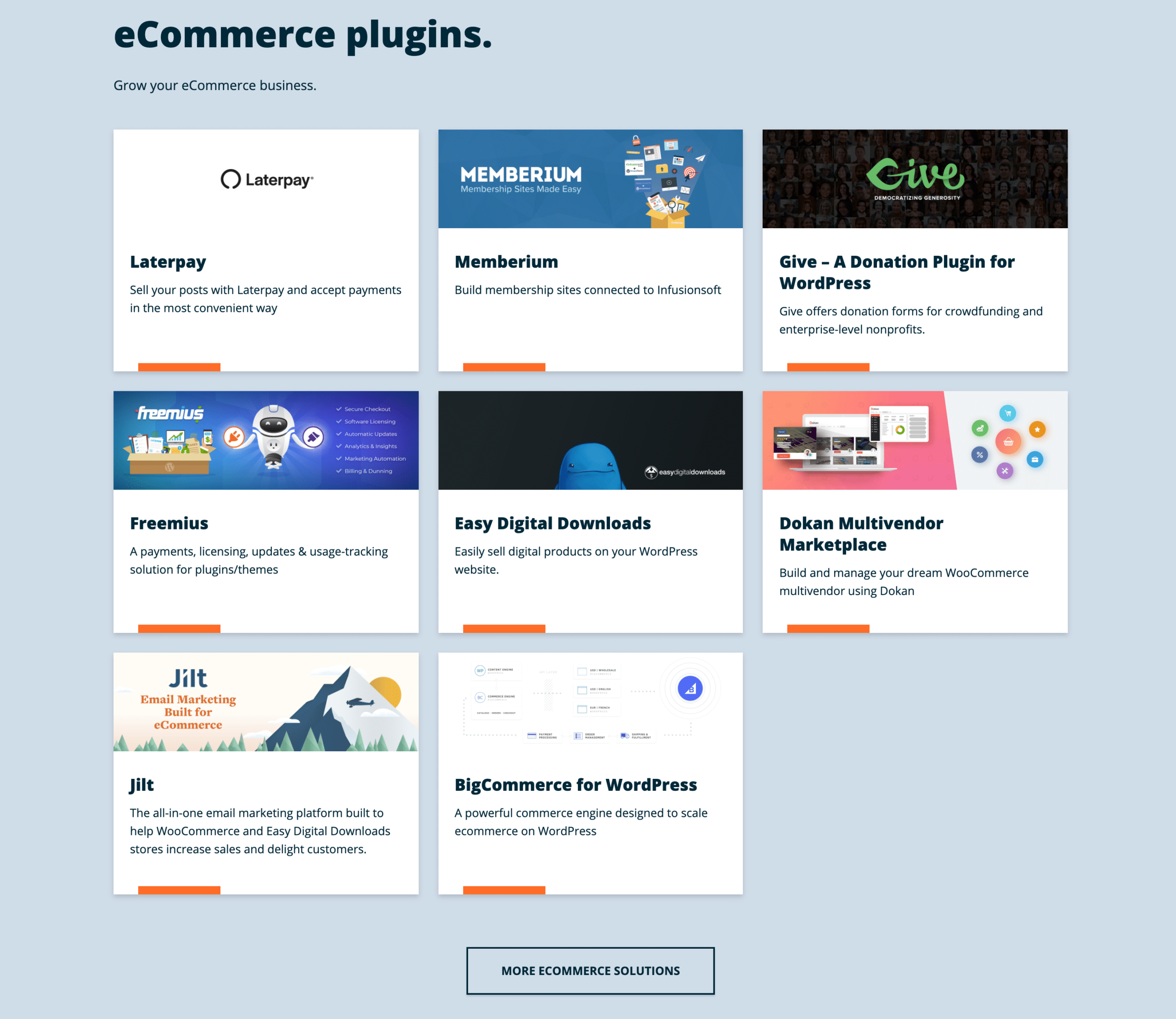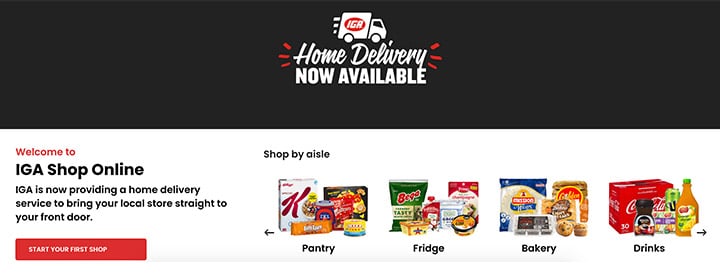
A powerful choice for eCommerce.
WordPress is building momentum as a powerful choice for eCommerce, but is that because it's the best option or simply because WordPress enjoys such widespread popularity today?
To find out, this guide takes a closer look at the pros and cons of using WordPress as an eCommerce solution compared to other options. First, we’ll look at the booming world of eCommerce, then we’ll examine ways you can use WordPress to tap into the growing digital marketplace and expand your business online.
A surging world of online sales.

At the onset of 2020, eCommerce was already a billion-dollar industry and an integral part of the overall economy. Today, eCommerce is outpacing even bullish expectations, and it’s quickly making “etailers” out of the staunchest brick-and-mortar devotees.
If you’re planning to launch an eCommerce business or add eCommerce to an existing business, you have numerous options at your disposal.
eCommerce platforms have proliferated, and while some of the larger options, like Shopify, Magento, and BigCommerce remain popular, WordPress is being used by more businesses and brands as a powerful eCommerce solution.
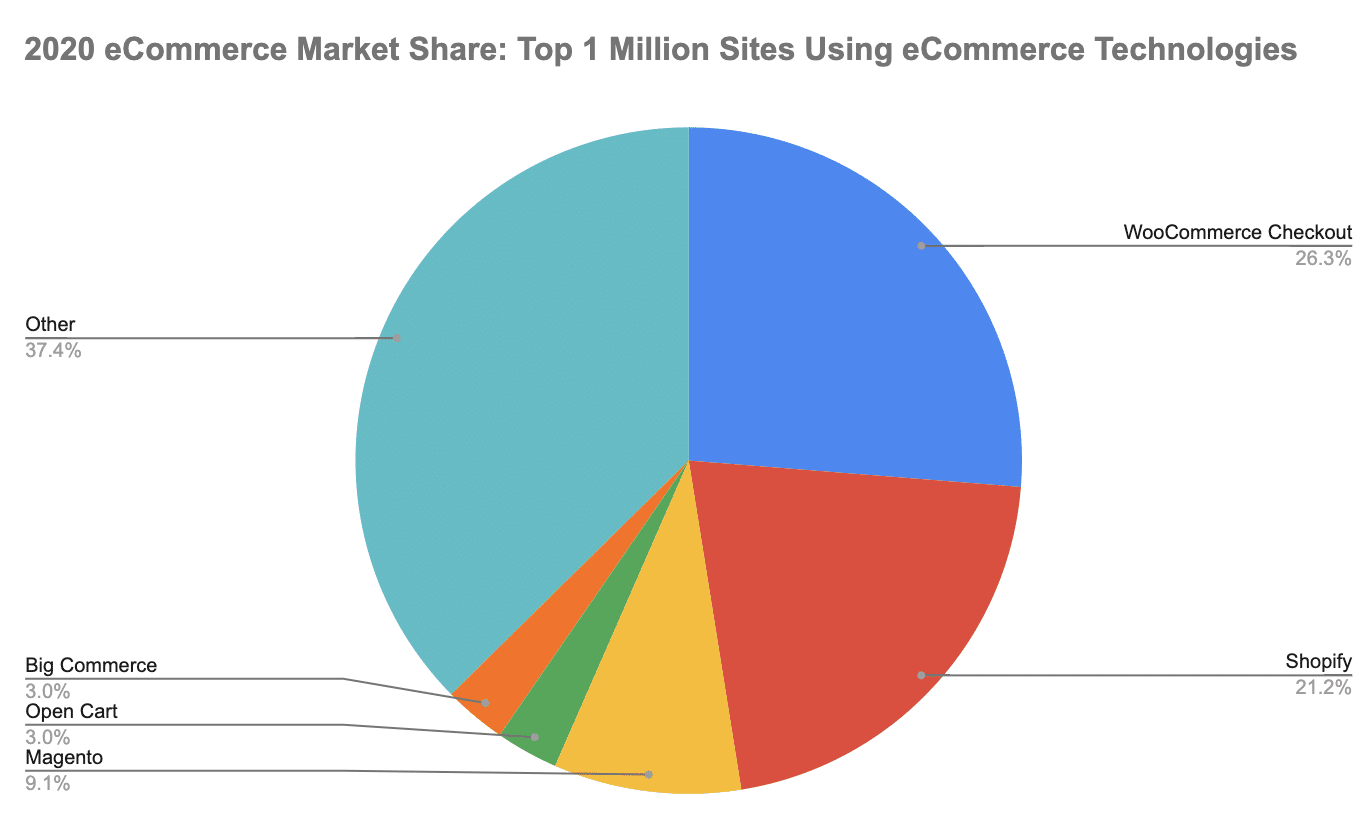
WooCommerce, the leading WordPress eCommerce plugin, now powers more than a quarter of the top 1 million eCommerce sites—and that's just one way of using WordPress to meet your eCommerce needs.
The truth is, WordPress is increasingly seen as a powerful foundation for eCommerce because of plugins like WooCommerce, as well as the overall flexibility WordPress provides as a CMS.
Before we dive into those details, it's important to understand just how large the eCommerce economy really is, and why you need a powerful solution that can keep up with today's digital demands.
The state of eCommerce today.

The surge of online activity in 2020 massively accelerated what was an already booming eCommerce marketplace. In 2019, for example, eCommerce sales reached $600 billion in the U.S. alone, making up more than 10% of overall retail sales.
In 2020, that number jumped to $794.5 billion, up 32.4% year-over-year, representing more than 14% of total retail sales. It’s a clear indication of the digital-first pivot so many businesses have had to make, and a validation from consumers that it’s a model they increasingly prefer.
It’s also a trend that shows no signs of letting up. In fact, eCommerce trends are expected to continue growing unabated, with some estimates placing global eCommerce sales as high as $6.5 trillion by 2023.
As younger audiences make up a growing segment of overall consumers, they too are fueling the rise of eCommerce. Gen Z, for example, which is the most Internet-dependent generation, has been a guiding force for the adoption of numerous technology trends—eCommerce included.

These savvy, digital natives not only shop and transact online with ease, they demand that the experience be fast, personalized, and seamless. Businesses that are meeting their needs are reaping the rewards (see Nike, Lululemon, and Domino’s). Businesses that have been slow to keep up are simply losing out.
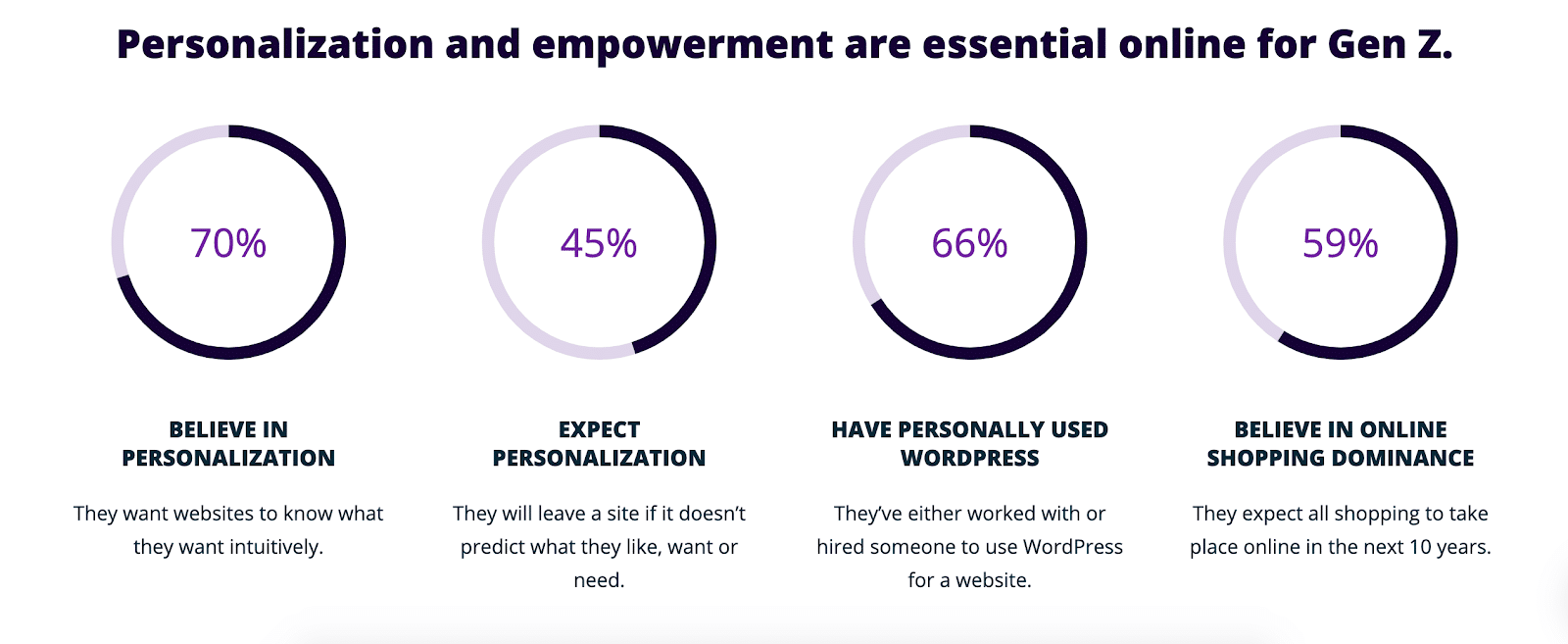
How do customers across all generations find stores and products online? 43 percent (so nearly half of all eCommerce traffic), comes from organic Google search. This means that Search Engine Optimization is an absolute must for anyone who wants to succeed in the eCommerce realm.
Social networks are also a huge driver of traffic and decision-making when it comes to eCommerce purchases. For example, 71% of consumers are more likely to make a purchase based on social media referrals.
In a nutshell, eCommerce remains a high-growth sector that is quickly becoming a must for businesses of all shapes and sizes.
While there is wide agreement on the upward trajectory of eCommerce as a whole, using WordPress to power your online store sparks a more detailed debate. Let’s discuss some of the arguments for and against using WordPress as your eCommerce solution.
Why you should use WordPress to power your online store.

Here’s why WordPress is an excellent eCommerce solution.
All the benefits of using WordPress.
Overall, WordPress is a great option for building any type of website, eCommerce included. These are some of the top reasons why:
It's free - Because it's open source and free from upfront licensing fees, WordPress is a powerful tool and a popular choice now more than ever. Your basic expenses will be hosting and purchasing a domain, while everything else is added, and decided on by you.
It’s mature - WordPress is built on well-understood and rigorously-tested technology, including PHP, SQL, and JavaScript. It has more than 17 years of development behind it, a dedicated global community of users that regularly contribute to its core software, and it’s been tested on literally millions of websites.
It’s easy to use - Ease-of-use is one of the main reasons WordPress adoption continues to skyrocket. Creating and managing your website with WordPress is easier than with closed, proprietary solutions, and it’s incredibly user-friendly for marketers and other content creators.
It’s secure - In collaboration with the WordPress Core Leadership Team, WordPress is protected by an expert security team backed by the global WordPress community. They can issue security updates on a moment’s notice and WordPress will apply them to core automatically, to keep your site safe.
It’s scalable - WordPress powers websites of all sizes, from startups and small business sites all the way to behemoths like TechCrunch and The New York Times. The list of notable WordPress users is impressive.
It’s extendable - You can make use of the thousands of WordPress themes and more than 55,000 free plugins available today, and not just for eCommerce. Whatever feature you want to add to your online shop, there’s probably a solution already out there.
It’s customizable - Another huge reason for WordPress’ popularity is how accommodating it is with regard to customizations. Whatever functionality you dream of, you can either implement it yourself or, more likely, find an existing plugin that does what you need. Same for design, nothing is off-limits.
It’s well-supported - As noted above, WordPress is maintained by an active community of thousands of professional developers and code testers. As a consequence, it has a highly reliable update cycle that provides new features, enhancements, and security improvements on a regular basis. The same is true for the leading eCommerce plugins.
These factors are among the many reasons WordPress now powers nearly 40% of the entire Internet.
Wide eCommerce plugin choices.

While the above speaks to the power of WordPress in broad terms, it’s also particularly well suited for eCommerce sites. For starters, the WordPress ecosystem includes a wide array of eCommerce-specific plugins that are excellent for opening up and managing an online shop:
WooCommerce - By far the most popular eCommerce plugin solution for WordPress. WooCommerce allows you to sell both physical and digital products. It also has a large number of add-ons and compatible themes, comes with inventory management, various payment and shipping options, and is well supported.
Dokan Multivendor Marketplace - Dokan extends the capabilities of WooCommerce, providing the best frontend experience combined with the exceptional features that every marketplace needs.
Easy Digital Downloads - As the name suggests this plugin is made for selling digital products like ebooks and online courses. It is beginner-friendly and works with almost any theme.
Laterpay - Laterpay makes buying and selling content effortless. The plugin offers an extremely flexible paywall platform that enables WordPress users of all sizes to easily monetize digital content, including articles, ebooks, audio, video, and livestreams.
MarketPress - A solution created by WPMU DEV. Comes with 15 payment gateways out of the box, allows you to build a single store or a network of shops, and sell both digital and physical products.
Memberium - Memberium allows you to easily create powerful, automated WordPress membership sites and online courses that are deeply integrated with Infusionsoft or ActiveCampaign
Cart66 - This plugin is highly security-focused. It is PCI compliant, has a built-in CDN (content delivery network) for enhanced speed and safety, integrates with MailChimp, and has “buy-now” buttons for social media and other marketing channels.
Other WordPress eCommerce plugins include Freemius, Metorik, and BigCommerce which also integrates with the CMS.
All of the above solutions tap into the deep extensibility of WordPress, which is one of its major value-adds. The right plugins can help you tackle mission-critical aspects of creating and managing your online shop—all without the need for custom code.
This includes creating product listings, inventory management, and configuring your shop. Most of the plugins listed above work with multiple currencies and across different geographic locations and tax rates.
Also, as with other WordPress plugins, they work with almost any website or theme. That way, you’re able to integrate eCommerce capabilities into your existing site instead of forcing those elements into an eCommerce-specific platform.
Most of these plugins also offer a free version so you can get your feet wet. If you need more functionality, you can extend them with free and paid add-ons. More on that in a moment.

Keep mission critical sites safe—automatically.
A world-class gallery of eCommerce themes.
Aside from plugins, WordPress also offers a lot of themes specifically made for online shops. In the WordPress theme directory, you even have a dedicated search option for finding these themes.
The advantage of using an eCommerce theme is that they are (or should be) made to look like a shop. So, if your goal is to create an online store, you have a template ready to customize.
Consequently, you’re also able to create a professional-looking store with just a few clicks of your mouse.
Due to the popularity of WooCommerce, there are many themes that are compatible with the plugin. Aside from that, makers of eCommerce plugins often offer special (and free) themes specifically for their plugins. This is true for WooCommerce and Easy Digital Downloads.
In addition to that, at least in the official WordPress theme directory, all new themes must be mobile responsive. That means an online shop built with one of these themes will look good and work on mobile devices.
In today’s world, where mobile Internet use has surpassed desktops, this is simply a must.
More reasons to use WordPress for your online store.

Awesome flexibility.
Flexibility is another argument for WordPress as an eCommerce solution. With a closed system like Shopify, you have to settle on a plan with set features you’re stuck with. In order to unlock more, you have to opt for the next higher tier, which is more expensive.
With WordPress, on the other hand, you have a mix-and-match approach. WordPress eCommerce works like WordPress in general: you have a great core product that you can enhance with plugins, in a way that fits your needs.
For example, you can take the eCommerce plugin of your choice and then add only the features you want, like additional payment gateways, membership features, or integrations for marketing tools. That way, you don’t have to shell out money for stuff you’re never going to use but that comes hardcoded into your eCommerce solution whether you like it or not.
This approach also gives you the option to build any kind of website and then simply add eCommerce capabilities to it. Other tools, like Magento or Shopify, are for eCommerce only. While some of them have optional tools like content creation capabilities, in the end, the only thing they really focus on is building an online shop.
Integrated marketing tools.
Speaking of content creation, using WordPress as your eCommerce solution means you also benefit from its excellent capacity as a marketing tool.
For one, WordPress is an incredible Content Management System (CMS). After all, it started out as a blogging platform and has expanded its content creation capabilities immensely over the years.

WordPress has everything you need to build a thriving company content channel, including a block-based editor experience that rivals many of the site-builder solutions on the market today.
WordPress also makes it easy to set up a comment system, post archives, taxonomies, and more. Plus, with eCommerce capabilities, you can even sell products directly from the posts inside your content hub.
Powerful SEO options.
WordPress is also incredibly SEO friendly. While SEO-optimized themes take care of the majority of technical SEO without you having to lift a finger, features like custom URLs and Yoast let you build optimized URLs, write click-worthy meta and title descriptions, and ensure all of your content is checking the SEO best practice boxes.
In addition to that, you can choose from a wide variety of high-quality SEO plugins to really take control of your on-page optimization. Some of them even offer dedicated add-ons for eCommerce. Further, mobile-friendly themes make sure Google doesn’t ignore your online shop as part of the efforts surrounding its mobile-first index.
Furthermore, WordPress plays well with social media. Content created with WordPress is well understood and looks good on Facebook, Twitter, and every other major social network.
Deeper integrations.
WordPress also integrates well with other third-party services, from bespoke martech solutions to Google Analytics. Known for its ability to "play nicely" with other technologies, WordPress can be bolted onto in various ways to help you track and optimize your efforts and make informed decisions about where to go next.
The WP REST API has opened up these possibilities even further, as have new, powerful use cases, such as headless WordPress configurations.
In short, WordPress gives you a proven, flexible system that offers many choices for creating the online shop you need, exactly as you envision it. It also goes beyond just the eCommerce aspect and provides all the tools you need to market your store once it’s set up and open for business.
Reasons WordPress may not be ideal for eCommerce.

Of course, there are also reasons people believe WordPress isn’t a good choice for eCommerce. Let’s explore some of the most common.
More moving parts.
The power of open source projects like WordPress is that they’re not centralized under a single product line or vendor. WordPress has no sole owner, and you’re free to use it for any purpose you want, which includes building an online store.
This freedom also places more responsibility in your hands. From hosting your WordPress site to choosing the right plugins and themes, to keeping your site updated and running smoothly, harnessing the full power of WordPress means making informed decisions about how to best put it to use.
WordPress is not a pure eCommerce platform with tiered feature sets and cookie-cutter templates, rather, it’s a highly flexible CMS with an entire ecosystem of available functionality, including trusted eCommerce solutions.
While eCommerce-only platforms tend to provide bundled services, including support, under one roof, that “single throat to choke” can quickly turn into vendor-lock in, especially if your site, and your business, are growing quickly.
With WordPress, you’re able to tap into vibrant developer communities, including the global WordPress community, for everything from support forums and documentation to ongoing platform innovation. These communities are also great places to find developers for-hire, which, with WordPress, is much easier to do than with other proprietary platforms.
What really ties WordPress together, particularly for eCommerce sites, is partnering with a managed WordPress host that can guarantee superior site performance and uptime in the face of high-traffic events.
WP Engine hosts a growing number of eCommerce-only sites, as well as other digital properties that have added eCommerce functionality over time. From small businesses to large enterprise organizations, many of these sites are capitalizing on the power of WooCommerce for their eCommerce needs, while benefiting from all of the additional flexibility that comes with WordPress itself.
WordPress is a popular target for hackers.
Because WordPress powers so much of the web, it’s certainly on the radar for hackers and other nefarious actors looking to exploit vulnerabilities and gain access to sensitive information. Like any website, WordPress site owners have to look out for things like DDoS attacks, cross-site scripting, and other top OWASP vulnerabilities.
For that reason, if you’re running an online shop (or, in fact, any site that handles sensitive information) you need to be extra careful with security. That begins with keeping your site, plugins, and other software updated, as the majority of breaches that occur on WordPress sites are due to vulnerabilities found in outdated plugins and other software.
Here too, working with a managed WordPress host is where an eCommerce site can thrive. Hosting companies that specialize in WordPress will have specific security protocols in place, such as HTTPS, vulnerability scans, and regular backups, for all of the sites that live on their platform.
Other providers may have additional security packages for sites that handle high volumes of credit card or other private information and need an extra layer of security.
Another huge benefit of WordPress is that by keeping your site updated and following general best practices, you can generally avoid many of the attacks listed above. As your site grows alongside your business, you can invest in stronger security measures.
Relatively hardware hungry.
Because WordPress operates with a degree of technical debt to ensure backwards compatibility, it can be more demanding on hardware than other platforms.
That also means, if your eCommerce site takes off and you need to handle a large number of visitors and customers, it can be taxing on servers and slow things down—not unlike other websites.
Again, a lot of this is in your hands. There are plenty of things you can do to ensure reliable performance even at higher demand.
Here, too, a managed WordPress host is key to avoiding the pitfalls of a slow website at scale. WordPress-specific hosts should offer caching, run the latest version of PHP, offer up-to-date hardware with SSD hard drives and lots of memory as well as other measures to make sure your site responds swiftly.
After that, you need to make sure you give your site a chance to be fast. That means using plugins wisely, making sure to optimize images, and performing regular maintenance tasks.
To sum up, WordPress offers some challenges when used as an eCommerce platform. It offers more moving parts than a single-vendor solution, it needs attention—like all software— in the area of security, and making sure it can respond at scale requires additional resources.
However, users have a lot of control in addressing all of these issues–in fact, they have the freedom to pick and choose how to best handle them.
WordPress for eCommerce; wrapping up.

eCommerce is not only booming right now, it’s the clear path for business success in the future. Those eager to get in on the action can choose from different options and platforms to create their own store. WordPress is one of them.
WordPress offers a lot of benefits when it comes to powering your eCommerce venture. First of all, you get to use a mature, flexible, and highly extendable open source platform that can be adjusted to your needs.
WordPress also comes with a solid eCommerce infrastructure already available, including highly-specialized plugins and themes that will allow you to quickly set-up a great-looking online store and go to market faster.
Aside from that, WordPress is flexible enough to not only build out an online shop with all the necessary features, it can also power any type of site you want to build around it. The list of advantages is rounded off with the growing number of excellent marketing tools that are now part of the larger WordPress ecosystem.
Overall, WordPress is an excellent solution for creating an online store, and one that now competes with propriety, eCommerce-only platforms. Whereas this recommendation once leveled off at the small-to-medium business level, enterprise organizations are now increasingly turning to WordPress for eCommerce, in addition to their content and brand marketing needs

